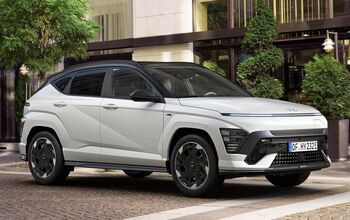Volkswagen Finds a Way to Dump Huge Numbers of Employees and Keep the Union Happy

Volkswagen’s plan to cut costs by cancelling underperforming models isn’t enough to right the scandal-rocked ship.
With an incredibly powerful workers union breathing down its neck, trimming its ranks has proved a tough operation. Meanwhile, there’s only so many models it can drop, and bills are coming due from the many fines, settlements, and lawsuits stemming from the diesel debacle.
How does Volkswagen get rid of 25,000 employees while placating a union boss who sits on the supervisory board?
According to Reuters, the answer comes down to one word: attrition. Specifically, retiring Baby Boomers.
The automaker has reportedly been in talks with its works council since June, hoping to find a solution that positions the company for stability and growth. Now, there seems to be a compromise that suits everyone, all thanks to employee demographics.
“We have the huge benefit of the baby boomer age groups,” Volkswagen labour boss Bernd Osterloh told German publication Handelsblatt earlier today. “That’s why we can also say the jobs of VW workers are safe.”
Volkswagen has a glut of Baby Boomer employees, and most of them are quickly approaching retirement. By closing the position after each employee leaves, the automaker figures it can unload 25,000 workers over the course of a decade. That’s about 20 percent of its German workforce. A drop in purchase spending and R&D costs would accompany the employee reduction.
If management convinces a good number of workers to take early retirement, savings could exceed $2 billion. Despite the agreement, there’s still acrimony in labor land. The union is reportedly angry over proposed cuts to white collar staff and outsourcing of service staff. Labor talks wrap up in November.
It isn’t just the scandal costs that Volkswagen needs to cover. As it moves away from diesel and gas-powered models, the automaker plans to offer a slew of electric vehicles riding atop modular platforms. The price tag attached to this sea-change is steep.
While many might see this as a “greenwashing” operation designed to wash away a sooty stigma, it could be in the company’s best interests. Germany might outlaw all hydrocarbon-based motoring in the foreseeable future, making an electric fleet a survival tactic.
[Image: Volkswagen of America]

More by Steph Willems
Latest Car Reviews
Read moreLatest Product Reviews
Read moreRecent Comments
- Zipper69 Speedmaster may be feeling their collar a little here...
- Zipper69 So, my '94 Ranger doesn't cut it?
- GregLocock Since fixed interval servicing costs per km or mile are dwarfed by any other line item except tires and batteries, I think you are barking up the wrong tree, for new vehicle owners at least.
- Theflyersfan Excellent dealer - 2 years scheduled maintenance included from the dealer (not Mazda) as part of the deal. One warranty repair - a bolt had to be tightened in the exhaust system. Only out of pocket were the winter tires and a couple of seasons of paying to get them swapped on and off. So about $1000 for the tires, $80 for each tire swap and that's it.
- EBFlex You can smell the desperation.


































Comments
Join the conversation
How much will VW owe these retirees in the way of pensions and other benefits? That's a significant burden for US automobile manufacturers.
As long as union leadership will continue to wet their beaks, who cares about the employees